|
|
|
Sort Order |
|
|
|
Items / Page
|
|
|
|
|
|
|
| Srl | Item |
| 1 |
ID:
099444


|
|
|
|
|
| Publication |
2010.
|
| Summary/Abstract |
Why did Australia fight in Iraq, while Canada did not? In this paired comparison, we go beyond explanations centered on the role of leaders to consider three alternative factors-ruling party opinion, public opinion and strategic culture. We argue that in both countries the Iraq decision followed the dominant views within the ruling party as well as the dominant strategic culture among the elites. As for the public opinion, its impact was significant in Canada, especially concerning the province of Quebec, while in Australia its impact was mostly neutral. This type of explanation, we suggest, is not only more historically grounded, but it can also illuminate broader patterns of Australian and Canadian foreign policy behaviour.
|
|
|
|
|
|
|
|
|
|
|
|
|
|
|
|
| 2 |
ID:
099445
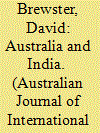

|
|
|
|
|
| Publication |
2010.
|
| Summary/Abstract |
Many Australian observers see Australia and India as 'natural' partners whose strategic perspectives are likely to become ever closer in coming years. This article will examine recent developments in the Australia-India security relationship and consider some possible limits to the strategic convergence of Australia and India, particularly in Indian Ocean security. It argues that Australia's challenge in coming years will be not only to address areas of common interest but to also actively engage with India on the interests and expectations of littoral states and extra-regional powers in the security of the Indian Ocean.
|
|
|
|
|
|
|
|
|
|
|
|
|
|
|
|
| 3 |
ID:
099446
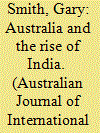

|
|
|
|
|
| Publication |
2010.
|
| Summary/Abstract |
Australia is at risk of being left behind by the pace of India's emergence as a regional and global power and its lack of engagement with India during this emergence. The Rudd Labor government is developing a framework which may make Australia a significant partner with India. There is the potential for a thoroughgoing engagement of interests and ideals in proposals Australia has put forward in three areas. Australia's vision of an Asia Pacific Community, with cooperation as its habitual operating principle, and with a membership that includes India and the USA as well as China and Japan, fills a multilateral gap. Secondly, the International Commission on Nuclear Non-Proliferation and Disarmament may provide a global framework assisting the development of Australian and Indian initiatives in the controlling and winding back of nuclear proliferation. Thirdly, Australia's national carbon pollution reduction program is intended to demonstrate international leadership and engagement in climate change, and opens the prospect for Australia of a substantial bilateral partnership with India (and others) to advance common interests around climate change. Australia, while emphasising its close relationship with the USA, is preparing to live in a region where the USA will, over time, be less influential as its relative power declines. As other great powers rise, Australia can actively pursue a hedging strategy to diversify its dependencies, and develop a much deeper engagement with that other emerging Asian giant.
|
|
|
|
|
|
|
|
|
|
|
|
|
|
|
|
| 4 |
ID:
099447
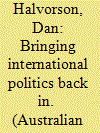

|
|
|
|
|
| Publication |
2010.
|
| Summary/Abstract |
This article argues that the failed-state phenomenon is not unique to the post-cold war era, nor is it uniquely threatening in comparison with other historical periods. The article contends that state failure is not primarily a failure of formal institutions of governance but a subjective condition defined by the great powers. 'Bringing international politics back in' is essential to a clear understanding of the issue for an emerging multipolar international system of the twenty-first century. The article draws on classical realist and critical constructivist perspectives to define state failure before developing a theoretical framework to reconceptualise the issue in a historical and international systemic context. Interpretations of state failure are based on the interplay of contingent transnational threats with the distribution of capabilities in the international system, the pattern of order in the international society, and the sensitivity of the domestic polities of leading actors to risk. The article draws some implications of this for the coming decades of the twenty-first century.
|
|
|
|
|
|
|
|
|
|
|
|
|
|
|
|
| 5 |
ID:
099443
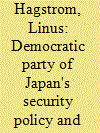

|
|
|
|
|
| Publication |
2010.
|
| Summary/Abstract |
A Referendum Law took effect in Japan in May 2010. Since a referendum is a prerequisite to any change to the Japanese 'Peace Constitution', this is an event with potentially far-reaching consequences. By gauging the Democratic Party of Japan's views on the issue of revision of the constitution-particularly revision of the famous Article 9, with remains a foundation of Japanese security policy-and by extrapolating on the findings, this article aims to further the understanding of the new government's security policy more generally. After finding that the probability that the Japanese government will capitalise on the coming into force of the Referendum Law to reopen the constitutional debate is currently low, the article advances a number of hypotheses as to why this is the case, and discusses scenarios under which the status quo could change. Finally, it draws out the implications (a) of the preceding analysis for DPJ security policy, and (b) of DPJ security policy for the interpretation of the constitution where Article 9 is concerned.
|
|
|
|
|
|
|
|
|
|
|
|
|
|
|
|
| 6 |
ID:
099442
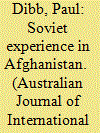

|
|
|
|
|
| Publication |
2010.
|
| Summary/Abstract |
This article examines the experience of the Soviet army's occupation of Afghanistan from 1979 to 1989. It draws heavily on the report of the Russian General Staff, which gives a unique insight into the Soviet-Afghan war by senior Russian officers, many of whom served in Afghanistan. The author then places this analysis in the broader geopolitical context of Soviet expansionism from the early 1970s to the mid 1980s. And the author proceeds to ask: Did Afghanistan account for the demise of the USSR? Finally, the issue of whether there are parallels with the failure of the Soviet Union's invasion and the current problems facing the USA in Afghanistan is examined.
|
|
|
|
|
|
|
|
|
|
|
|
|
|
|
|
|
|
|
|
|